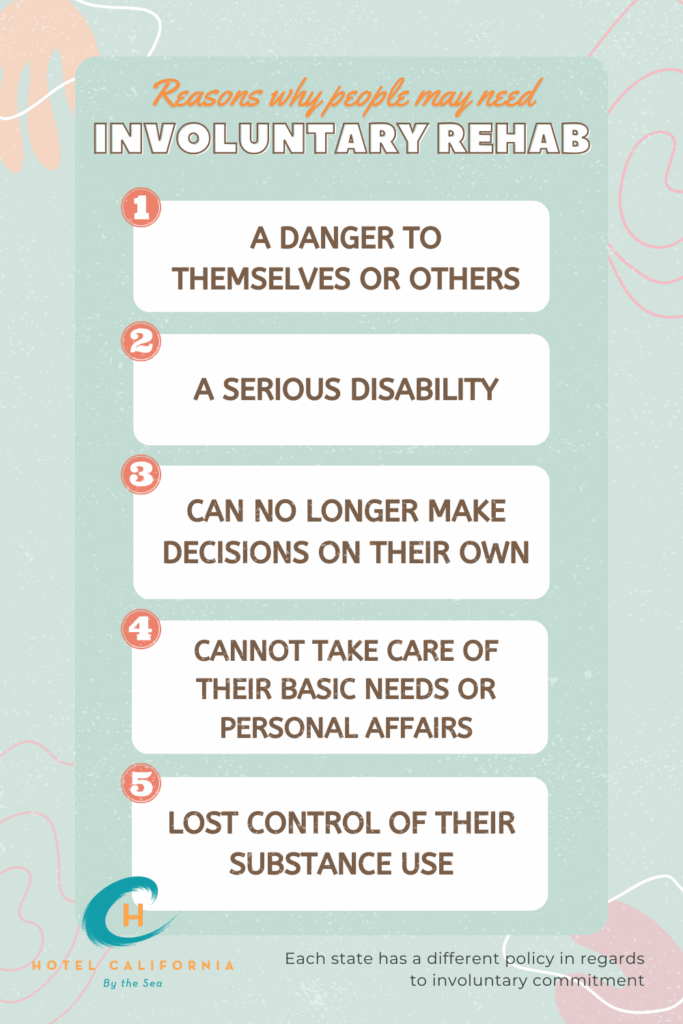Involuntary Rehab
Involuntary rehab is a term used to describe a situation in which it is appropriate for a person to be placed in addiction rehab treatment without their consent. It is the act of forcing someone with a substance use disorder to enter rehab treatment even when they do not want to go. It is a legal process that makes treatment mandatory for the person in question. Involuntary rehab or involuntary commitment is only appropriate in specific situations and is not a decision that should be taken lightly.

When a person is suffering from a substance use disorder or an alcohol use disorder and they have become a danger to themselves and others, sometimes the safest decision for all is to enter rehab. However, the person may be in denial of their condition, or have co-occurring mental health issues. Whatever the case may be, the person in question isn’t always willing to comply. This is when involuntary rehab may be considered.
As of 2022, 37 states and Washington, D.C., have laws pertaining to involuntary commitment. California, Ohio and Washington carry involuntary rehab laws. The details on these regulations will vary from state to state. Each state carries different guidelines for who can petition for involuntary commitment, clinical assessments, judicial review, treatment length and treatment type.
Reasons why People do not receive Substance Use Disorder Treatment
According to the National Survey on Drug Use and Health, there are a multitude of reasons why some people do not receive substance use disorder treatment. Some of the reasons can fall out of scope of the person’s control.
- The person is not ready to stop substance use
- The person does not have health insurance
- The person is unable to pay for treatment, which can be expensive depending on where, what type of treatment and if insurance is involved
- The person is not able to find an appropriate treatment program
- The person fears that going to treatment may negatively impact their job and career

Reasons why some People may need Involuntary Rehab
- The person may be a danger to themselves and others
- The person has a serious disability
- The person can no longer make decisions on their own due to severe cognitive impairment from substance use
- The person cannot take care of their basic needs or personal affairs
- The person has lost control of their substance use
Types of Involuntary Rehab
When someone is sentenced to involuntary commitment, it is usually due to a court order or considered in a court proceeding. Court-ordered rehab is probably the most common form of involuntary rehab. A person charged with a crime that was only committed in order to help or fuel their substance use disorder is someone who would be sentenced to involuntary rehab. For example, they break into a car and steal money because they need it to buy more drugs due to their drug addiction.
The court can impose specific requirements that must be met to complete the conditions set by a court ruling. In this situation, the court will set conditions that must be followed and it is usually in place of jail time. When a person is charged with a drug or alcohol related crime, some form of involuntary addiction treatment is required.
Their family or a state’s request can involuntarily commit a person to treatment. Concerned family members or the state may feel the person is a danger to themselves and others due to untreated substance use disorder. The concerned party may file a petition with the court to seek involuntary commitment for the person experiencing a drug crisis.
The process of Involuntary Rehab
When you first begin to notice signs a person may have a substance use disorder, the next step is to educate yourself on the subject, find resources and then reach out to the person. Have a conversation with the person and get them to talk about their problems. This can be the most difficult part because they may not respond positively. They may become hostile, defensive or in denial about their issues. You can suggest treatment, but that doesn’t mean they will agree to go.
Each state has a different policy in regards to involuntary commitment. However, generally, the first step is to fill out an emergency petition for commitment by a person who has knowledge of the user’s condition. In some states, only a health care professional can file a petition. In other states, anyone with knowledge of the person’s condition can file a petition. This includes family, friends and law enforcement.
According to the National Alliance for Model State Drug Laws, a person may be considered an appropriate candidate for involuntary placement in rehab if they exhibit the following:
- They are not physically safe around themselves or others
- They are will be a physical threat to themselves or others
- They cannot provide for basic needs such as food and shelter and no one else can provide it for them
Each state carries different laws allowing for involuntary rehab and treatment for those with substance use disorder. Most regulations allow for persons 18 and older to be involuntarily committed.
Check Your Insurance Coverage for FREE
Find out if your insurance covers addiction treatment in minutes. We accept most insurance!
Differing State Laws on Involuntary Rehab
- In California, substance addiction is not classified as a plausible reason for involuntary rehab. However, families can show that their loved one is unable to care for themselves or may be in danger of hurting themselves. If this is the case, you may be able to enact a petition for rehab.
- In Ohio, the state requires family members who would like to commit a loved one, to demonstrate that substance misuse and substance use disorder are putting them and others in danger. Families must prove that treatment will be the best solution.
- In Washington, under the Involuntary Treatment Act, families can apply for involuntary rehab for their loved one based on a substance use disorder as long as they prove the addiction is a grave disability. The person can no longer care for themselves or control themselves while under the influence of drugs.
Benefits and Drawbacks to Involuntary Rehab
Involuntary rehab is usually only implemented under dire circumstances and is not a simple process to get someone into addiction treatment. There are some benefits and drawbacks to the treatment process.
Some believe you cannot force someone to change when they are not ready to. If the person feels they are being held against their will, they may resort to their old habits once they leave the court order duration of treatment ends. This increases the rate of relapse and overdose once they have been released.
According to the National Institute on Drug Abuse, treatment does not need to be voluntary to be effective. In many cases, involuntary rehab has been proven to be very effective in treating substance use disorder and co-occurring mental health disorders. Studies have shown that these types of sanctions can increase treatment entry and retention rates. It can also result in the overall success of treatment intervention methods.
In other cases, sometimes a person isn’t even able to think clearly for themselves to understand they need help. Between their cravings and their own addiction, they are easily overwhelmed and do not know what to do or how to get help. Getting them into treatment by involuntary commitment can bring them one step closer to sobriety and healthy living.
Reach out to Hotel California by the Sea
We specialize in treating addiction and other co-occurring disorders, such as PTSD. Our Admissions specialists are available to walk you through the best options for treating your addiction.
Treatment for Substance Use Disorder
Hotel California by the Sea provides treatment at all levels of care including detox, residential, PHP and IOP. We utilize evidence-based treatment methods such as CBT, DBT and EMDR therapy. Our behavioral health treatment program is dedicated to helping client reach their goals of sobriety and overcome their addiction.
References:
https://www.addictioncenter.com/treatment/involuntary-rehabilitation
https://rehabs.com/treatment/involuntary-rehab
https://www.health.harvard.edu/blog/involuntary-treatment-sud-misguided-response-2018012413180
https://zinniahealth.com/substance-use/blog/involuntary-rehab
https://www.bicyclehealth.com/blog/involuntary-rehab
